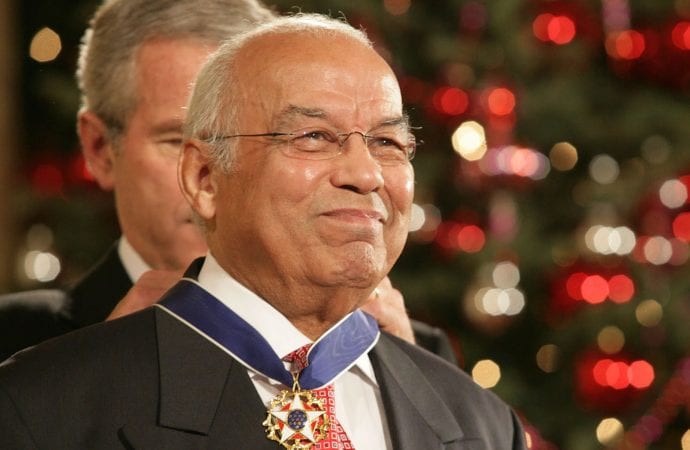Longtime civil rights leader and a pioneer in Catholic higher education, Norman Francis, will receive the nation’s oldest and most prestigious award for American Catholics.
The University of Notre Dame announced Sunday that Francis will be the recipient of the 2019 Laetare Medal. He will receive the honor at the university’s commencement exercises on May 19.
Francis served as president of Xavier University of Louisiana for nearly 50 years - a post he accepted as the first African American to hold the job on the same day that the Reverend Martin Luther King, Jr. was assassinated in 1968.
Xavier was founded by Saint Katherine Drexel as the nation’s only historically black and Catholic university, at a time when the U.S. Constitution upheld segregation as the law of the land. The heir to a banking fortune, Drexel poured her wealth into education and equality initiatives targeted toward African Americans and Native Americans.
“I did not build Xavier. I was part of Katharine Drexel’s mission to provide a quality education for all,” Francis said in a statement.
“All the people I worked with were part of this plan and mission, which was not only honorable but totally necessary when you look back at what the United States was at the time,” he said.
Even so, during Francis’s tenure at the university, Xavier became the nation’s leading producer of undergraduates who would go on to complete medical school. In addition, Xavier leads the nation in the number of African-American students who earn undergraduate degrees in biology and life sciences, chemistry, physics and pharmacy.
Francis also oversaw the university’s efforts to nearly triple its student enrollment and realize an eightfold increase its endowment.
Born in 1931, Francis himself is a product of Catholic education supported by Drexel’s initiatives. He was the first African American to be admitted into Loyola University Law School in New Orleans in 1952. After law school, he served in the U.S. Army before becoming a dean at Xavier in 1957.
His brother, Bishop Joseph Francis, is an auxiliary bishop of Newark, New Jersey, and was the fourth African-American to be elevated to the episcopacy in the United States.
In addition to his work at the university, he has advised eight U.S. presidents on education and civil rights issues and has served on 54 boards and commissions. Francis has also been a member of the Vatican’s Pontifical Council for Justice and Peace, and, following Hurricane Katrina, he served as chair of the Louisiana Recovery Authority.
No stranger to prestigious awards, in 2006 Francis received the Presidential Medal of Freedom from U.S. President George W. Bush, the nation’s highest civilian honor.
“For more than 50 years, Dr. Francis has been at the center of civil rights advocacy by leveraging the power of Catholic higher education,” said Notre Dame President Father John Jenkins. “In bestowing the Laetare Medal upon him, Notre Dame recognizes his leadership in the fight for social justice through educational empowerment.”
The Laetare Medal is announced each year on the fourth Sunday in Lent, known as Laetare Sunday. The University of Notre Dame established the award in 1883 to serve as the American counterpart to the Golden Rose, a papal honor that goes back to the 11th century.
The award has a rich history in American Catholic life, with previous recipients including President John F. Kennedy, Dorothy Day, Vice President Joe Biden, former Speaker of the House John Boehner, Cardinal Joseph Bernardin, and, most recently, Sister Norma Pimentel, one of the nation’s leading defenders of immigrants who runs Catholic Charities at the U.S.-Mexico border in the Rio Grande Valley.
The Laetare medal bears the Latin inscription, Magna est veritas et praevalebit (“Truth is mighty, and it shall prevail”) and recipients of the annual award are honored for their distinguished work “whose genius has ennobled the arts and sciences, illustrated the ideals of the Church and enriched the heritage of humanity.”
“I am honored by Notre Dame recognizing me in this way,” Francis said in his statement. “I think the fact that I have the privilege of being among the Laetare awardees is itself a hope and an inspiration, not just for the students, but for many others as well.”

